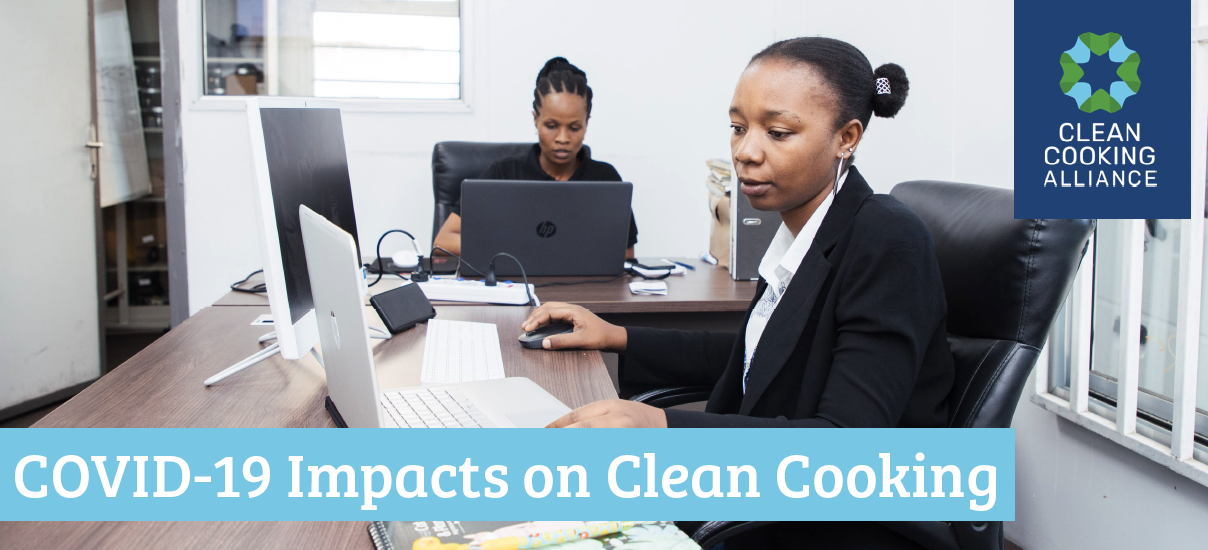Pandemic Threatens Access to Clean Cooking Energy, Potentially Worsening Air Pollution and COVID-19’s Impact
As COVID-19 spreads around the world, a new survey of companies, investors, donors, and other stakeholders working in the clean cooking sector shows that reliable access to modern cooking energy could be in danger.
The survey, conducted April 6-13 by the Clean Cooking Alliance, received more than 300 responses. One hundred eleven clean cooking enterprises responded, including cooking energy producers and distributors, cookstove manufacturers, and many others across the supply chain. Enterprises ranged from small enterprises producing just a few stoves a year to larger enterprises with thousands of customers.
Of the enterprise respondents, nearly one-third have temporarily ceased all operations or will do so imminently. In addition, two-thirds stated they were expecting moderate to severe disruptions due to COVID-19.
“Industries around the world, including in the clean cooking sector, are experiencing unprecedented disruptions,” said Dymphna van der Lans, CEO of the Clean Cooking Alliance, which works to build an inclusive industry that makes clean cooking accessible to the three billion people who live each day without it. “The impacts could be devastating for the millions of families that have transitioned to clean stoves and cooking fuels such as electricity, biogas, liquefied petroleum gas, or ethanol. People may be forced to return to firewood, charcoal, and other unhealthy and polluting cooking methods.”
The survey results come as new research suggests that people exposed to air pollution are more likely to die from COVID-19 than people living in areas with cleaner air. These findings reinforce the importance of access to clean cooking as an alternative to open cooking fires and traditional stoves, which are significant sources of household air pollution.
The survey found that 80 percent of investors responding to the survey have delayed financing decisions, while 60 percent reported being less likely to support clean cooking enterprises as a result of COVID-19. These types of impacts could be particularly challenging for early-stage clean cooking enterprises, which cater to low-income households and have a limited ability to withstand serious operational interruptions or delays to their capital raising plans.
While 63 percent of donors responding to the survey reported delaying funding decisions, just as many remain confident in their likelihood of supporting clean cooking activities. Moreover, 75 percent reported adding new or enhanced funding mechanisms to support existing projects.
Closing knowledge gaps could help address investment concerns. Eighty-five percent of investors reported that information about consumers’ ability to pay and other evolving market dynamics would be helpful in their decision-making, and 65 percent expressed an interest in acquiring more information about enterprises’ risk management plans. The majority of donors expressed similar requests, and also called for greater information sharing between peers, enterprises, and other relevant networks.
Many organizations are already moving to support energy entrepreneurs through funding, information, and other needed resources. For example, a consortium of partners intend to launch the COVID-19 Energy Access Relief Fund to fill funding gaps as a result of the pandemic. In addition, GET.invest opened a special “COVID-19 Window” in its Finance Catalyst to provide clean energy businesses and project developers with free-of-cost advisory to help navigate the crisis.
The Clean Cooking Alliance remains committed to supporting such efforts, including by continuing to curate helpful resources, monitor developments across the sector, and work closely with partners.

